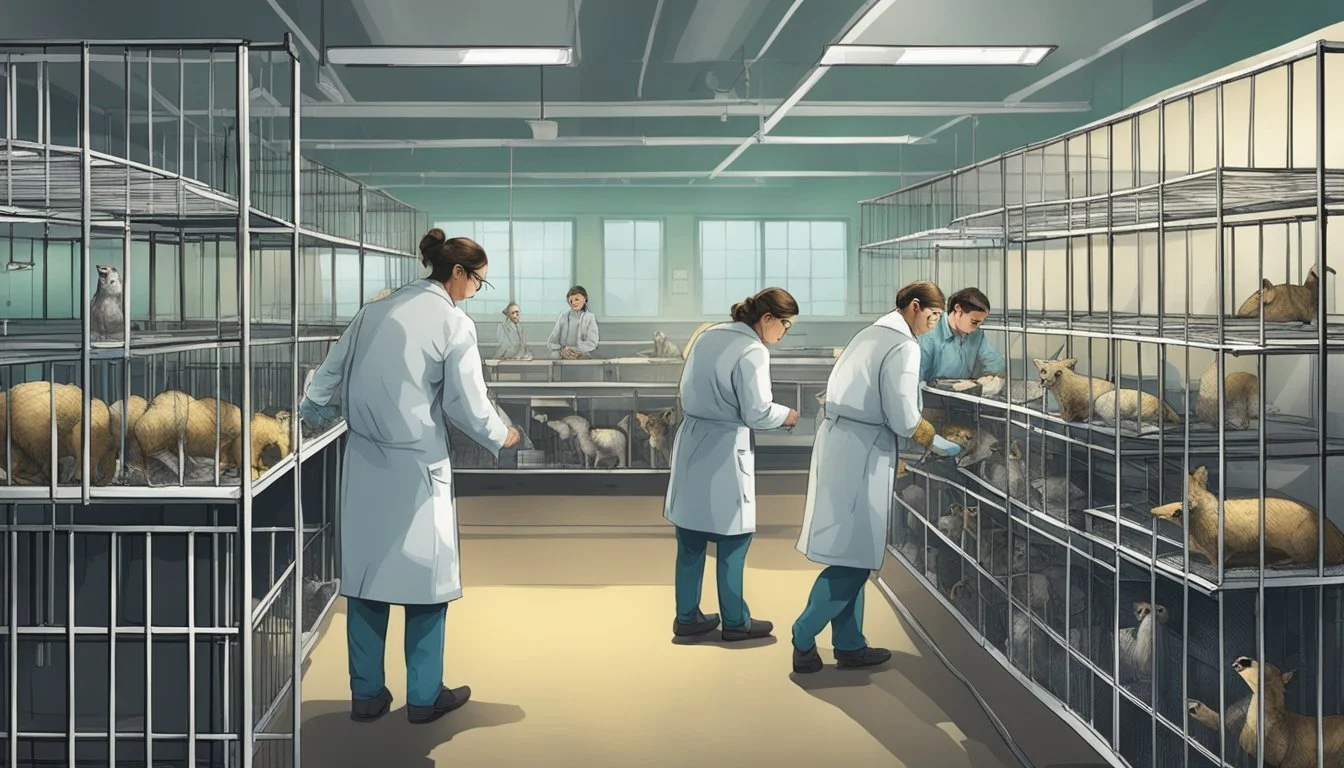5 Shocking Documentaries on Rogue Scientists and Their Dangerous Experiments
Unveiling Unethical Research
Science has long captivated the public imagination, but sometimes the pursuit of knowledge can lead researchers down dark and dangerous paths. Documentaries exploring rogue scientists and their unethical experiments shed light on the potential consequences when scientific ethics are abandoned.
These films offer viewers a sobering look at what can happen when brilliant minds use their talents for nefarious purposes. By examining real cases of scientists who crossed ethical lines, these documentaries serve as cautionary tales about the importance of oversight and moral considerations in scientific research. They provide valuable insights into human nature and the responsibility that comes with scientific knowledge and power.
1) Three Identical Strangers
Three Identical Strangers tells the remarkable story of triplets separated at birth and reunited by chance at age 19. The documentary explores the shocking circumstances behind their separation and reunion.
Robert Shafran, Edward Galland, and David Kellman were born on July 12, 1961, and adopted by different families. Their reunion in 1980 sparked media frenzy and raised questions about nature versus nurture.
The film reveals a disturbing truth: the triplets were part of a secret study on identical siblings raised apart. Dr. Peter Neubauer, a prominent child psychologist, orchestrated the separation for research purposes.
As the documentary unfolds, it exposes the ethical violations and long-lasting impact of the study on the triplets and their families. The brothers' initial joy at finding each other gives way to anger and confusion.
Three Identical Strangers raises important questions about scientific ethics, the rights of adoptees, and the psychological effects of separation on multiples. It serves as a cautionary tale about the potential dangers of unchecked scientific ambition.
[https://en.wikipedia.org/wiki/Three_Identical_Strangers]
2) The Experimenter
"The Experimenter" is a thought-provoking biographical drama that delves into the controversial experiments of social psychologist Stanley Milgram. Released in 2015, the film stars Peter Sarsgaard as Milgram and Winona Ryder as his wife Sasha.
The movie focuses on Milgram's infamous obedience experiments conducted at Yale University in 1961. These studies examined how far people would go in following orders from an authority figure, even if those orders conflicted with their personal conscience.
Director Michael Almereyda presents the story in an unconventional manner, with Sarsgaard frequently breaking the fourth wall to address the audience directly. This unique approach adds depth to the exploration of Milgram's work and its lasting impact on psychology.
"The Experimenter" raises important questions about human nature, ethics in scientific research, and the power of authority. It offers a compelling look at one of the most controversial figures in 20th-century psychology.
https://en.wikipedia.org/wiki/Experimenter_(film)
3) Project Nim
"Project Nim" is a thought-provoking documentary that explores the controversial experiment conducted by behavioral psychologist Herbert Terrace in the 1970s. The film chronicles the life of Nim Chimpsky, a chimpanzee taken from his mother at birth to be raised as a human child.
Terrace's goal was to determine if a chimpanzee could learn human language and communication. Nim was taught sign language and lived with a human family in New York City. The experiment initially showed promising results, with Nim learning over 100 signs.
However, as Nim grew older and stronger, the challenges of raising a wild animal in a human environment became apparent. The documentary reveals the ethical concerns surrounding the experiment and its impact on both Nim and his human caretakers.
The film raises important questions about the boundaries of scientific research and the treatment of animals in experiments. It highlights the emotional toll on those involved and the complexities of interspecies relationships.
"Project Nim" serves as a cautionary tale about the consequences of pushing scientific boundaries without fully considering the ethical implications. The documentary offers a balanced perspective on this controversial experiment and its lasting effects.
https://en.wikipedia.org/wiki/Project_Nim_(film)
4) The Stanford Prison Experiment
The Stanford Prison Experiment, conducted in 1971 by psychologist Philip Zimbardo, remains one of the most controversial studies in psychology. A new documentary titled "The Stanford Prison Experiment: Unlocking the Truth" premiered at the Tribeca Film Festival, shedding light on this infamous experiment.
The film offers an unprecedented look at the study through firsthand accounts of the original "guards" and "prisoners." Many participants speak on camera for the first time, providing fresh insights into the psychological impact of the experiment.
The documentary explores how quickly the simulated prison environment led to abuse of power and psychological distress. It examines the ethical concerns raised by the experiment and its lasting influence on psychology and our understanding of human behavior.
Archival footage and post-experiment interviews are featured, allowing viewers to witness the pathology that developed among participants. The film draws comparisons with real prisons, highlighting the broader implications of the study's findings.
"The Stanford Prison Experiment: Unlocking the Truth" stimulates critical thinking about authority, obedience, and the potential for situational factors to shape human behavior. It serves as a powerful reminder of the ethical responsibilities in scientific research.
More information on The Stanford Prison Experiment
5) The Bhopal Disaster: A Reckless Experiment
The Bhopal gas tragedy of 1984 stands as one of the worst industrial disasters in history. A documentary film explores the catastrophic events that unfolded at the Union Carbide India Limited pesticide plant in Bhopal, Madhya Pradesh.
On the night of December 2-3, 1984, over 40 tonnes of highly toxic methyl isocyanate gas leaked from the plant. The release exposed more than 500,000 people in the surrounding areas to the deadly chemical.
The film examines the negligent safety practices and cost-cutting measures that led to the disaster. It highlights how warnings from journalist Rajkumar Keswani about potential dangers at the plant went unheeded.
The documentary details the immediate and long-term health impacts on the local population. Estimates suggest up to 25,000 people died in the hours and days following the leak, with many more suffering ongoing medical issues.
The film also investigates the aftermath, including the controversial role of then-Prime Minister Rajiv Gandhi in allowing Union Carbide's CEO to leave India. It serves as a stark reminder of the potential consequences when industrial safety is compromised.
[https://en.wikipedia.org/wiki/Bhopal_disaster]
Understanding Rogue Science
Rogue science refers to scientific research conducted outside established ethical and regulatory frameworks. It often involves controversial experiments that push boundaries and raise moral concerns.
Definition and Characteristics
Rogue science encompasses experiments that defy conventional ethics or regulatory oversight. These studies often involve human subjects, genetic manipulation, or dangerous pathogens. Rogue scientists typically work independently or in secret, avoiding peer review and institutional safeguards.
Key characteristics include:
Lack of ethical approval
Disregard for safety protocols
Absence of transparency
High-risk research objectives
Motivations vary from pursuit of scientific breakthroughs to personal fame or financial gain. Rogue experiments may yield valuable insights but also pose significant dangers to participants and society.
Historical Context
Rogue science has a long and troubling history. Notable examples include:
Nazi medical experiments during World War II
The Tuskegee syphilis study in the United States
Soviet biological weapons research
These unethical studies led to the development of international research guidelines. The Nuremberg Code (1947) and the Declaration of Helsinki (1964) established principles for ethical human experimentation.
Despite regulations, rogue science persists. Recent cases involve gene editing of human embryos and unsanctioned clinical trials. Advances in biotechnology have made some experiments more accessible, raising new ethical challenges.
Ethical Implications of Dangerous Experiments
Dangerous experiments conducted by rogue scientists raise serious ethical concerns. These issues extend beyond the immediate risks to research subjects and can have far-reaching consequences for science and society.
Impact on Scientific Reputation
Unethical experiments damage the credibility of scientific research. When scientists violate ethical guidelines, it erodes public trust in the entire scientific community. This loss of trust can lead to skepticism about legitimate scientific findings and hinder important research.
High-profile cases of misconduct often receive intense media scrutiny. This negative attention can overshadow valuable scientific work being done by responsible researchers. Funding for important studies may be jeopardized if donors and institutions become wary of supporting scientific endeavors.
Ethical violations also undermine the peer review process. Scientists rely on honesty and transparency to build upon each other's work. When data is fabricated or protocols are ignored, it can misdirect future research efforts.
Risks to Public Safety
Dangerous experiments pose direct threats to research subjects and potentially to the wider population. Inadequate safety protocols or reckless disregard for human welfare can lead to injuries, infections, or even deaths.
Some experiments may produce hazardous materials or organisms. If not properly contained, these could escape the lab environment. Accidental exposure could harm researchers, their families, or surrounding communities.
Ethically questionable research findings might be misused by bad actors. Data on biological weapons or surveillance techniques could fall into the wrong hands. Even well-intentioned studies might yield information that poses unforeseen risks if widely disseminated.
Psychological experiments can inflict lasting trauma on participants. Studies involving deception or emotional manipulation may cause long-term mental health issues for subjects.






